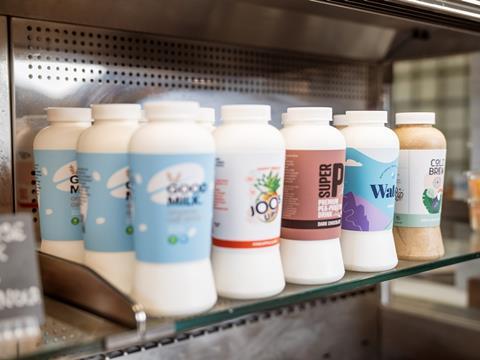
PA Consulting and PulPac have announced that rigid packaging company Logoplaste has joined the Bottle Collective, which aims to create single-use, fibre-based bottles, as a technology partner.
Logoplaste joins global companies Diageo, Haleon, and Sanofi as a member of the Bottle Collective, which brings together brands and packaging manufacturers across industries in a bid to accelerate progress towards sustainable single-use bottles.
The Bottle Collective is working to produce bottles that have a lower environmental impact usage than typical single-use versions but are cost-competitive and scalable for mass volume production. The Collective leverages Dry Molded Fiber technology, which utilizes renewable pulp and cellulose resources to create fibre-based bottles that can be recycled as paper packaging.
Logoplaste will be taking an active development role in the Bottle Collective to improve the overall barrier performance of the bottle lining technology and adjust it to the specific needs and requirements of the consortium.
Jamie Stone, partner at PA Consulting and PulPac design and innovation lead, said: “Together with our global brand partners, we can fast-track the development of the world’s first Dry Molded Fiber bottle. We’ve already created the technology and the process.
“Partnering with established leaders in the rigid packaging space like Logoplaste reinforces to the market that our Dry Molded Fiber bottles are capable of being produced at the speed, volume, and cost necessary to match the massive scale of this global industry challenge.”
At the end of last year, we spoke to Cullen, a finalist in our 2023 Sustainability Awards, about its Fibre Bottle packaging solution for dry goods. Aiming to reduce single-use plastic waste, the company claims to produce the world’s first scalable paper bottle alternative to plastic bottles and pouches for dry goods, for sectors including personal care, home care, pet care, and horticulture.
Earlier in 2023, RyPax and CelluComp unveiled what is said to be the first all-fibre bottle solution with a biodegradable and plant-based inner coating, hoping to ‘crack the code’ on paper-based bottle packaging.
CelluComp’s microfibrillated cellulose product Curran, sourced from the root vegetable product waste stream, has been implemented into a pulp fibre alongside bamboo and bagasse. Apparently resulting in a strong material with low porosity, the pulp is applied as a thin coating to the inside of the bottle as a replacement for a plastic liner.
If you liked this story, you might also enjoy:
The Brief: How viable is biorecycling for plastics?
Report: How the top brands are progressing on packaging sustainability
The Brief: Using ocean-bound plastic in packaging – how, why and should we?














No comments yet